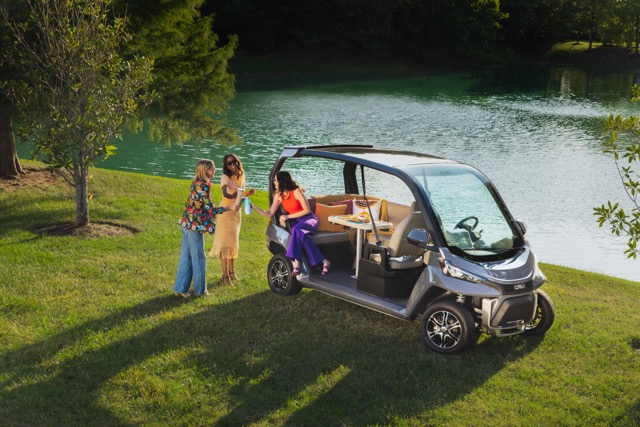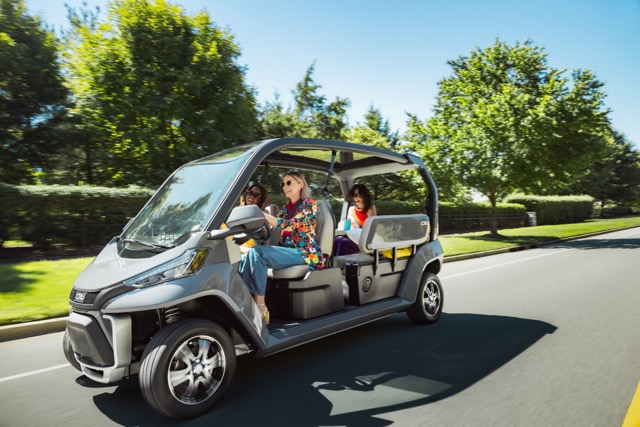
Think about how you use your vehicle. For most, it’s a lot of short commutes and shuttling people around. Those without a vehicle to get around might not see the purpose in owning a highway-ready hauler for jaunts around town. CRU, the latest offering from established golf cart manufacturer Club Car, may be able to do everything most of us want a vehicle to do, particularly an entry-level EV.
CRU is a NEV (neighborhood electric vehicle), much like a stretched golf cart. It’s not focused on toting golf bags around while you angrily drive to your latest sliced drive sitting dozens of yards off the fairway. Instead, CRU is meant for hauling people and groceries and is designed to be customizable. Its base configuration is a bit limousine-like, with an L-shaped bench in the rear of the vehicle and two seats up front. There’s an optional table in the back, and the front passenger seat can swivel around to face those sitting in the back. The CRU’s rear seating compartment is only open on one side – the right curb-facing side – for a few unique reasons.
In collaboration with Designworks (the firm behind BMW’s best and boldest concept cars), Club Car tells The Manual they wanted CRU to be interactive for riders and a “hub” for your short-distance travels. It can reach speeds up to 35 miles per hour and has three-point seat belts for all riders. The closed side of the CRU is street-side; you could drive up to a curb and unload kids or other passengers safely, and without fear they’d sprint out into traffic. CRU also has all the safety bells and whistles mandated by the government, like headlights and side mirrors.
Designworks tells The Manual that the open-side design is also meant to be inviting.
My take: CRU is most of what made the VW Microbus concept car so enjoyable, just for a more bespoke audience. Club Car did a lot of research and found tens of millions of homes within a short distance of amenities. And a lot of those homes are in large subdivisions where people may want to visit friends or take kids to and from school or sports practices.
Club Car is trying to define a market with this proof of concept. We see golf carts used as primary short-trip vehicles in retirement communities with aplomb, making CRU feel like the natural next step for this type of travel, something Club Car calls “Neighborhood Electric Vehicles” (NEV).
There are obvious concerns with a NEV like the CRU. It requires a more temperate, dry climate. It’s most useful as a second vehicle, and securing items like groceries or whatever you may pick up during shopping trips is not possible. You likely wouldn’t park it outside, which means you’d need a secure area like a garage to house the CRU Car. Luckily, the platform CRU Car is built upon leaves many customization options, just as we see with golf carts, so future iterations may not require you to house it in a closed space.
The CRU is also about $27,000, which edges very closely to pricing for small EVs like the Chevy Bolt. But the CRU isn’t a Bolt and doesn’t want to be. And we wouldn’t want that, either. CRU is uniquely cool and quirky. Many people will buy the CRU Car when it comes out, and it’s easy to see why.
For now, Club Car is sticking with its existing dealer network for the CRU Car and launching across the southern US, starting near its main manufacturing plant in Georgia.






